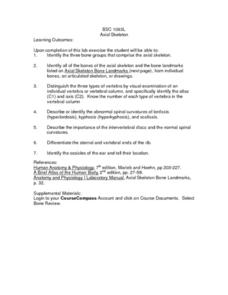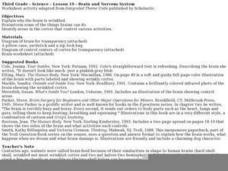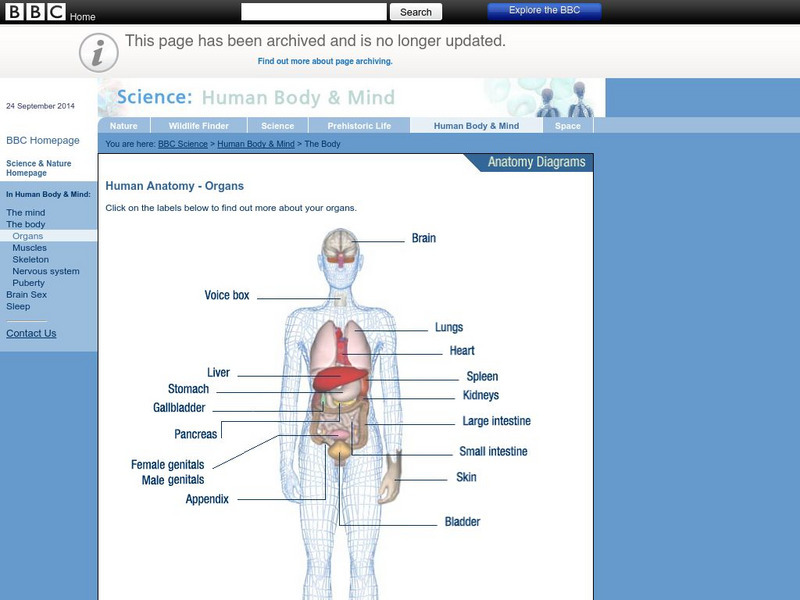Curated OER
Reading Comprehension
What reading strategies improve comprehension? Give your class a few strategies to try while they read this short passage on education and science. Then, have them complete the multiple choice questions that follow. The answers are...
Curated OER
All About Me
Young scholars examine who they are through the arts and sciences. They create a portfolio entitled, " All About Me."
National Center for Case Study Teaching in Science
A Healthy Retirement?
Do men and women experience heart disease the same way? High school and college-level biologists examine a case study about a woman, Nancy, who is experiencing intermittent health issues; looking at her diet, exercise, and lifestyle...
Curated OER
Proper Hygiene
Third graders discuss the importance of personal hygiene and cleanliness. They examine why good oral hygiene is a significant part of maintaining a healthy body. They focus on the need for daily baths, hair care, and teeth cleaning. They...
Curated OER
The Skeletal System
Students identify bones off a skeleton during quizzes; assemble disarticulated skeletons; bird, frog and rat. They dissect frogs, remove the muscle tissue, and identify of bones.
Curated OER
Evolution worksheet
Looking at evolution in detail, this thorough worksheet has complex questions requiring details and explanations of natural selection and diversity. Various examples of biological characteristics are available, and students choose the...
DiscoverE
A Leg to Stand On
Give your learners a leg up in their study of engineering. Groups design and create a prothestic for a leg. They test out their designs for strength, stability, durability, and comfort.
Curated OER
Axial Skeleton and Fetal Skull
In this science worksheet, learners identify bone groups from a given list. Students list each bone included in the axial skeleton. Learners answer questions about specific bones, their location and importance.
Curated OER
Disorders of the Brain
High schoolers, in groups, conduct research about a specific disorder of the brain, create a character study of a person with that brain disorder, and then present the information to the rest of the class.
Curated OER
Da Vinci's Renaissance
Students study the Renaissance through an examination of the life and accomplishments of Leonardo Da Vinci.
Curated OER
Show 303: New Research into Dyslexia
Students explore the causes of dyslexia. They view CT sans and MRIs to view the brain and how it responds. Students read reports about dyslexia. They discuss the nature of dyslexia, its cause, how to diagnose it, and its permanency.
Curated OER
Classroom Identity
Young scholars explore fingerprints. In this finger prints lesson, students investigate how to classify fingerprints. Young scholars study large pictures of fingerprints and circle the patterns they know how to identify. Students then...
Curated OER
Adapting to the Dark-Bats and People
Students consider how cavers make adaptations to the cave as do bats.
Curated OER
Micronutrient Need Intervention
Students investigate the real world applications of nutrition. They study the problem of starvation and how it affects different populations. Students work in small groups in order to devise and intervention plan. They also search out...
Curated OER
Brain and Nervous System
Third graders study the physical characteristics of the brain and identify its parts through this series of lessons.
Curated OER
Shells
Sixth graders label diagrams of the 6 different classes of mollusks and explain the meaning of the labeled terms. They identify 8 common New Haven shells. They organize their own shell collection during this series of lessons.
Curated OER
Five Senses - Learning With The Senses
Students name the five senses, compare learning with and without the senses.
Curated OER
What Do You Know About Horseshoe Crabs?
Learners create a learning tool based on information given on the assigned website. In this ocean life lesson, students read about the horseshoe crab and develop a worksheet, scavenger hunt, board game or any tool to aid learning. They...
Curated OER
Jumpy Dolls
Learners are challenged to design and construct a jointed figure that moves in a motion something like jumping jacks when a string is pulled.
Curated OER
Mathematics In You
Students construct ratios using the hand as data. They use examples of cortical and trabecular bone found in the long bones to measure circumference, diameter, length, and weight of long bones. They perform computations using growth...
Curated OER
The Ant Attack
Third graders observe the daily activity of an ant farm. Through observations and journal writing, they gather data concerning the daily activities of the ants. Students use their observations to predict the effect of environmental...
National Cancer Institute at the National Institutes of Health
Seer Training Modules: Introduction to the Human Body
Self-guided learning activity where students learn about the functions, processes, and anatomy of the human body. There is a short quiz at the end of the lesson to check for understanding.
BBC
Bbc: Human Anatomy: Organs
Explore the anatomy of the human body. Click on an organ or other body part to read more about its structure and function, and then try out an interactive activity for that organ.
Other
The Visual Dictionary: Volume 3: Human Body
Academic resource where students learn about the human body through images that explain objects. Click on an image to get a fully defined, detailed view of a particular body part.
Other popular searches
- Human Body Anatomy
- Human Body Anatomy Sketching
- Human Body Anatomy Diagrams
- Human Biology and Anatomy
- Human Body Anatomy Muscles
- Human Body Anatomy Game
- Human Body Anatomy Brain
- Human Body Anatomy Bones
- Human Body Anatomy Hearing
- Human Body Anatomy Veins
- Human Body Anatomy Immune
























